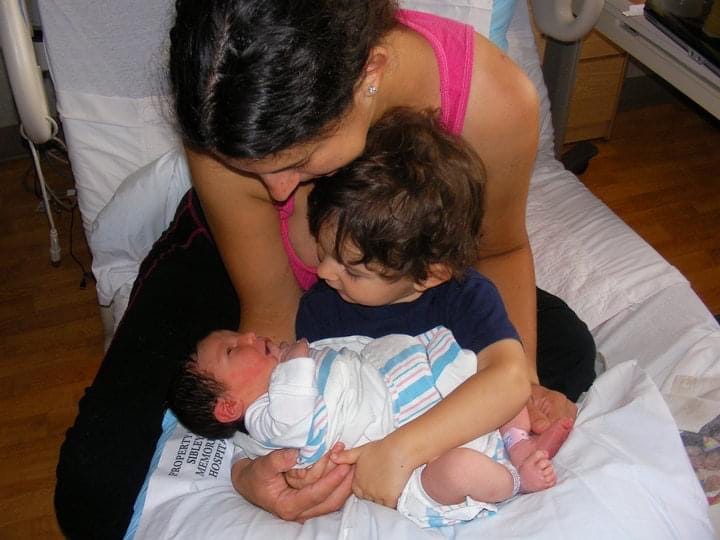
MICHAEL TRAN/AFP via Getty Images
As soon as the two bright pink lines on my home pregnancy test appeared, happily and suddenly, I knew what kind of birth I wanted.
I was committed to bringing my daughter into the world as gently as possible without interventions or pain medication. I spent nine months preparing, learning how to relieve the pains of childbirth naturally, and mentally committing to holding my daughter skin-to-skin, chest-to-chest, and nursing her moments after birth.
I did everything I could to stay healthy and prepare my mind and body for the marathon of giving birth. I ate right, gave up caffeine, exercised, and went to prenatal yoga several times a week.
And when nothing went as planned, I struggled with my life postpartum.
I left the hospital without my baby
Despite my meticulously detailed, carefully crafted idea of how my daughter’s birth would unfold, nature took a different turn. My water broke, and I needed Pitocin, a drug that starts contractions.
Things got worse when my baby showed signs of distress. Instead of being able to move around the room as I had hoped, I needed to stay in bed, hooked up to monitors and oxygen.

Courtesy of the author
Inexplicably, the doula I had hired to help guide me through the birthing process didn’t answer her phone for hours as I continued to labor throughout the day. Although my husband did his best to help, I felt as though I had been abandoned, left to navigate this new and frightening experience on my own.
I kept reminding myself that even though nothing leading up to giving birth was going as planned, it would all be worth it once I held my happy, healthy baby in my arms. However, that didn’t go as planned either. Shortly after my daughter was born, she was whisked away to the neonatal intensive care unit. She stayed there for weeks, in a clear isolette that helped keep her alive, as she was diagnosed with one complex medical issue after another. She was fed through a tube, and I needed permission to hold her, help to put her in my arms without disturbing the various monitors and wires attached to her tiny body.
Hailey Bieber’s words resonated with me
Not having the type of birth I wanted was difficult, but leaving the hospital without my baby caused a tremendous amount of grief. The NICU staff and my OB all suspected that I had postpartum depression.
My husband had to go back to work before our daughter was released from the hospital, and I was mostly left to cry alone. I lost all of my baby weight and then some quickly. People told me how great I looked, but it was hard to take the compliment well. But the pounds fell off, not because I was lucky or focusing on my health. Instead, I was overwhelmed and depressed, unable to find the motivation to nourish myself.
When I read about Hailey Bieber’s traumatic experience giving birth to her son Jack, I was immediately brought back to my daughter’s birth and the aftermath. Like me, Bieber’s labor started with pitocin rather than with the natural waves of contractions many women are taught to expect. After giving birth, she faced a life-threatening complication. Instead of spending the hours after giving birth bonding with her son, she faced invasive interventions to save her life and stop her from hemorrhaging. Bieber has opened up about how hard it has been for her to face what happened and the aftermath, along with the difficulties of adjusting to being a new Mom in a new body.
Celebrity moms and regular moms struggle equally
Too many women have had experiences similar to Hailey’s births that didn’t go as expected. Bieber, a model and entrepreneur who is married to one celebrity, Justin Bieber, and is the daughter of another, Stephen Baldwin, has access to the best care available and a “team of experts” to help her recover, find her identity as a mother, and feel like herself again. I am very glad that Bieber has this support, and wish it had been available to me and the countless other mothers who go through similar experiences.
Things weren’t much better when I had my second child, a surprise baby. After my son’s birth, the hospital staff largely ignored me when I told them I was in tremendous pain that was unlike anything I had experienced when I had my daughter. When I asked for help lifting my son and changing his diaper because the pain made it so hard to move, I was admonished, nurses telling me that it wasn’t their job to hand me my child, and I would need to work through the pain. I was bleeding uncontrollably, but was only told that I could get no more than my allotted share of ultra-thin maternity pads, which were disappearing at an alarming rate.
About an hour after I arrived home, I passed something extremely large, the size of my child’s head. My husband called an ambulance, and I was diagnosed with a retained placenta, a potentially life-threatening condition if not caught and treated. I needed to be admitted to the hospital for several days for IV antibiotics to treat the infection that had already set in. This shook my confidence in the medical system and robbed me, once again, of the precious first days home with a newborn.
While I wish that Bieber and all mothers could have the type of labor they want, sometimes the best-laid birth plans are impossible. Hopefully, Bieber’s bravery in being vulnerable and honest will help other mothers like her and me get the support they need when things don’t go according to plan.
The post Hailey Bieber said she struggled with postpartum life. After a difficult birth, I know exactly how she feels. appeared first on Business Insider.




